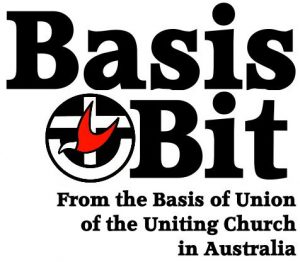9 September – On being careful what you pray for
Pentecost 16
9/9/2018
1 John 5:14-21
Psalm 146
Mark 7:24-37
In a sentence:
We pray for those things for which the church gives thanks
There is to be a lot – again – going on in our reading today. While I’ll focus on just one aspect of the passage, I suspect that the point drawn from that illuminates the other seemingly problematic and challenging assertions John makes here. I’ll leave the work of finding that illumination to the hearers and readers of what I do say!
* * * *
Conventional wisdom has it that we ought to be careful what we pray for, lest we actually get it.
The point here – not often made explicit – is that we don’t know what to pray for, that we don’t see clearly enough our confusions about our needs, and so we shoot prayer off in the wrong direction.
What, then, should we pray for, keeping in mind that our answer must be a specifically Christian one, springing from of what we know about the God who deals with us in Jesus? John helps us with this in our final text from his first letter today: pray for those things which are ‘according to God’s will’.
Immediately, of course, the question arises, What then does God will? Again, John helps: we have heard over and over in our meandering through the letter that God wills only one thing which might be expressed in two ways: that we believe that Jesus is the Son, that we love one another.
Put differently, God wills reconciliation, for this is the substance of God’s work in Jesus and of the life of love we are to live. We pray for reconciliation because reconciliation is what God does, what God gives. Praying for something which God does not give – the answer to the exam question, the parking spot in front of the bank or even, perhaps, the long and happy life – is not prayer in the Christian sense.
It is God’s will that the world be reconciled to God and to itself, and it is this for which we are to pray. The absence of such Godly reconciliation is seen in human hubris and selfishness; it is seen in the fear of our creaturely mortality and the denial of the life of the body; it is seen in the borders and the ‘-isms’ which drive us apart. To pray according to the will of God is to pray that those things be taken away which divide us from God, from each other, and from peace with ourselves.
Prayer is, then, ultimately not prayer that this or that thing happen or not happen – it is not a kind of spiritual technology for getting things done. Prayer is our stand against sin and its divisive effect. (In passing, we might note that John moves directly from the affirmation about prayer to praying for sinners).
More specifically, Christian prayer is prayer that we never despair, that we never collapse into action or attitude which expresses that, in the end, not the God who raises the dead but some other is Go – perhaps Death itself. The sin against which we pray is not naughtiness; it is the false perception of who really is God, and so the wrong conviction about where hope really lies. The final verse of John’s letter, ‘Keep yourselves from idols,’ seems to hang rather strangely from nothing in the text unless we see that it is as much a remark about what prayer is, as it is about who we are to pray to.
We can never know in advance precisely what prayer for reconciliation sound like, for it springs from a particular situation. Yet the basic orientation of a Christian’s prayer is given in the established prayers of the church. Specifically, if we want to know what to pray for, we look to what it is for which the church gives thanks. This is because when the church gives thanks as the church, it does so in its priestly function in the world. The church responds on behalf of the world to what God gives to the world: the promise and ongoing work towards the reconciliation of all things with God.
The thanksgiving prayer of the church sits at the centre of its liturgy – at least its theological centre, even if it might be the first prayer in a particular liturgy. This prayer ‘controls’ the other prayers of the service, which either lead up to the thanksgiving, or follow from it. In our liturgy here at MtE, thanksgiving features principally in the ‘great prayer’ of the Eucharist (‘the Eucharist’ means, from Greek, ‘the Thanksgiving’). This prayer gives an account of gift of creation and the gift of salvation.
The familiar Great Prayer from Uniting in Worship – heard often enough here and in other Uniting Churches – runs like this:
Thanks and praise, glory and honour are rightly yours,
our Lord and God,
for you alone are worthy.
In time beyond our dreaming
you brought forth life out of darkness,
and in the love of Christ your Son
you set man and woman at the heart of your creation.
We thank you that you called a covenant people
to be a light to the nations.
Through Moses you taught us to love your law,
and in the prophets you cried out for justice.
In the fullness of your mercy
you became one with us in Jesus Christ,
who gave himself up for us on the cross.
You make us alive together with him,
that we may rejoice in his presence
and share his peace.
By water and the Spirit
you open the kingdom to all who believe,
and welcome us to your table:
for by grace we are saved, through faith.
This might be said in any number of ways but the point today is not to thanksgiving it itself. Rather, we are to see in it the clue as to what we are to pray for – those things which the prayer declares God gives. We are to pray that the thanksgiving of the Great Prayer be truly our thanksgiving, that our lives be lived in the assurance of that reconciliation with God, with ourselves and in ourselves that the prayer names.
We will all, at times, be poor, sick, hurt, disappointed, oppressed, afraid or guilty. The words we say in our prayer will be expressed in these terms, although we may not receive what we asked for in the terms we asked, because brokenness does not define wholeness.
The basic prayer of the church on behalf of the world is that God be ours, and we be God’s: your kingdom come, your will be done – earth be heaven. Another biblical writer in the family of John put the object of prayer this way: that the home of God be among mortals,
that he will dwell with them;
that they be his peoples,
and God himself be with them;
that he wipe every tear from their eyes; that Death will be no more; nor mourning or crying or pain (c.f. Revelation 21.3f).
Whatever it is which causes us to turn to God in prayer, this is the substance of what we pray for, and it is no mean prayer.
The guarantee of God’s response to this prayer is that it is God’s own desire that it be so, and that God gives us what he desires for us.
Let us, then, meet God’s desire with our own, and pray as he wills, that all which God has to give us will indeed be ours.



